
by jlansber | Apr 23, 2020 | Alumni Profiles
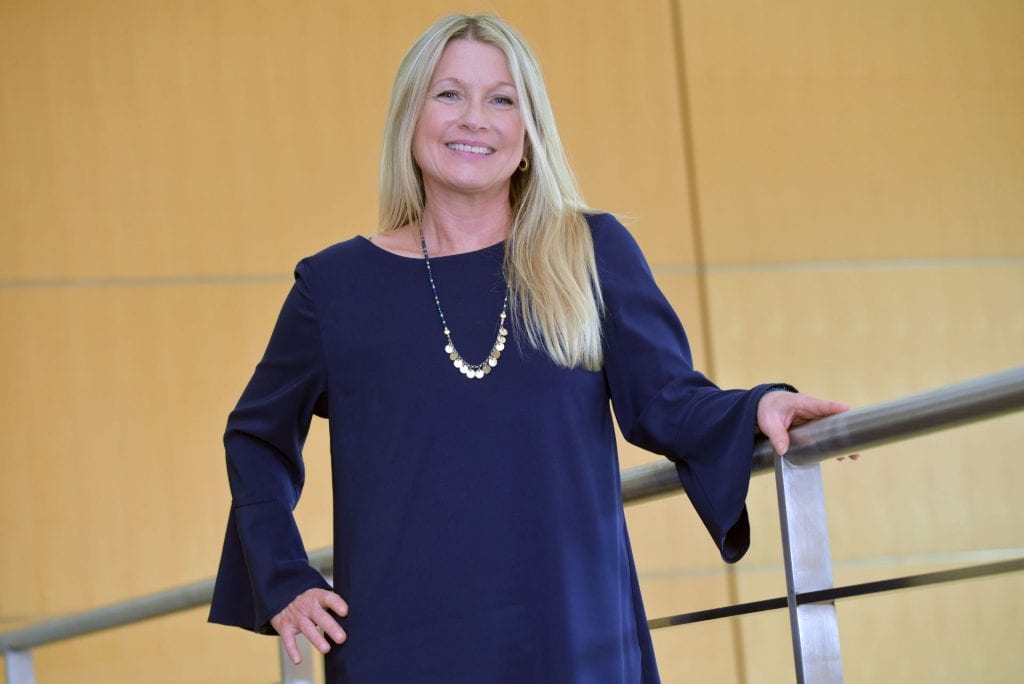
Marianne Markowitz (MBA ’92) CEO, First Women’s Bank
When I think about the impact DePaul had on my life and career, I also go back to networks. DePaul expanded my perspective, my skill set, but perhaps most importantly, my network— a network I continue to leverage and grow today.
Marianne Markowitz (MBA ’92) is leading the launch of Illinois’ first new commercial bank in a dozen years. Called First Women’s Bank, the innovative, Chicago-based institution will serve small and midsize businesses and individual depositors, with a focus on women’s banking needs. Markowitz brings experience as the former Midwest regional director of the Small Business Administration to her role as bank CEO. In this interview, she shares why she is passionate about this groundbreaking bank startup, which is scheduled to open this year.
What motivated you to establish First Women’s Bank?
There is a well-documented and addressable gender gap in lending, but no one is addressing it. Women are starting businesses at two times the national average, yet they receive just 16% of conventional business loans. Our mission is to help bridge that gap, help grow the small-business economy and advance the role of women within it. That’s incredibly motivating to me!
What’s unique about this venture?
Everything! We’ll be the first de novo bank in Illinois in more than a decade and the only bank with a strategic focus on women in the nation. We have built an incredible team, and we’re guided and supported by a talented and experienced board. People are drawn to our mission to grow the economy and advance the role of women within it. The support we are receiving and the excitement this launch elicits continue to surprise me. It’s truly the opportunity of a lifetime.
What are the current challenges and opportunities facing small businesses in Chicago and beyond?
Historically, one of the biggest challenges facing small business was access to capital; now it’s about access to the right capital. Because larger banks tend to focus on larger, more profitable middle-market companies, the service levels for small businesses have suffered. As a result, a new crop of fintech ventures have emerged to fill the gap with fast cash. There are lots of providers offering immediate capital with opaque terms.
Small businesses are signing up for these loans without fully understanding the aggressive repayment terms, which can sometimes be predatory in nature. In addition, there are fewer trusted advisers to guide small businesses to the best capital solutions to meet their needs. While capital is one piece of the puzzle, a strategic network that can provide access to information, technology and marketing opportunities can be as powerful as capital. We intend to provide access to innovative capital solutions and connect our clients to networks of opportunity to help them achieve their goals.
How did your upbringing and education lead you to a career in business and public service?
I was raised in a working-class community, and I saw firsthand the achievement gaps that exist when there are few paths to consider and no networks to leverage. I’m a very commercial person, so I was drawn to business early on, I think, in part, because I saw so many different possibilities. That was exciting to me, and that ultimately led me to DePaul for my MBA and a career in finance.
A pivotal moment in my career came when I joined the 2008 Obama campaign as chief financial officer. It was the first time I had the opportunity to marry my skills with my passion and values. Once you experience leveraging the skills you’ve worked so hard to build with what matters to you most, then you are no longer working—you’re living your values. And that’s how I feel about the work we are doing at First Women’s Bank. We’re building more than a bank. We’re creating a platform that will allow small businesses, corporations and individuals to demonstrate their commitment to gender equality and women in leadership.
How did your DePaul education shape your career and life?
DePaul had a fantastic banking and trading focus. At the time, I was working on complex trading instruments, so it was great to go to school at night and immediately go back to work the next morning and apply what I was learning. It was at DePaul that I focused on banking for the first time. In fact, we had a project where we had to design an innovative bank from scratch, and my team designed a mobile bank. I’ve thought about that project a lot as we prepare to launch a mobile bank. The technology is dramatically different, but the fundamentals are not.
When I think about the impact DePaul had on my life and career, I also go back to networks. DePaul expanded my perspective, my skill set, but perhaps most importantly, my network— a network I continue to leverage and grow today.
What advice do you have for recent DePaul graduates?
My advice is to leverage the broad network that DePaul offers. Broaden your perspective, look beyond your current job or area of study. Look up, look across, look around at the many paths that DePaul can help lead you down. See your professors not only as teachers, but as advisers for your future. And find a way to marry your skills and experience with your passion.
By Robin Florzak | Photo by Kathy Hillegonds

by jlansber | Apr 23, 2020 | Professional Development
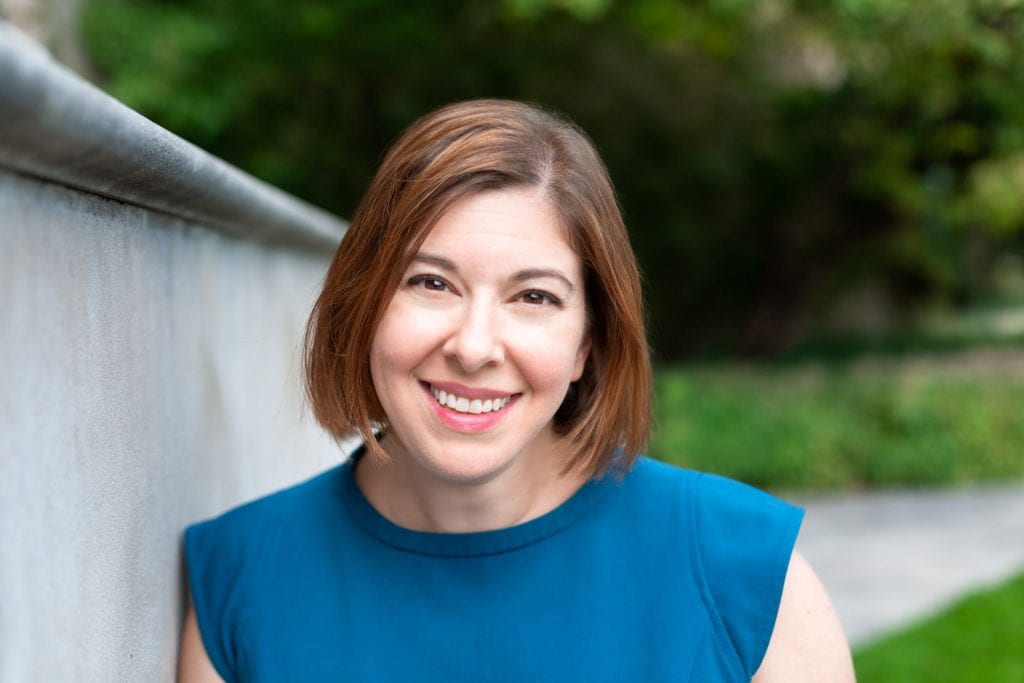
Alyssa Westring | Photo: Erielle Bakkum Photography
Alyssa Westring has been researching work-life balance for 18 years, since before she became a parent.
Now an associate professor of management in the Driehaus College of Business and a mother of two, Westring thinks a lot about the advice her mother gave her when she was growing up. You can have it all, she told Westring. You can have a career and be a go-getter and do anything you want to do.
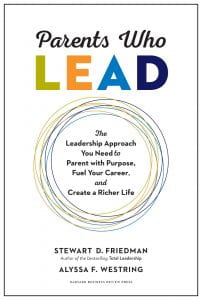 “In college I was surrounded by incredible, driven women who wanted to have careers but who also wanted to have a family and a life, and I saw my generation, my peers, confused and worried about how they were going to make both happen successfully,” she says. “I started to wonder: how do we create a life where we can have career success but also be parents, be healthy and be involved in our communities?”
“In college I was surrounded by incredible, driven women who wanted to have careers but who also wanted to have a family and a life, and I saw my generation, my peers, confused and worried about how they were going to make both happen successfully,” she says. “I started to wonder: how do we create a life where we can have career success but also be parents, be healthy and be involved in our communities?”
This question took Westring to graduate school, where she studied organizational psychology and researched anticipated work-family conflict—how people think about future challenges they might face in their careers and family lives and how that thinking influences their career choices.
“I was doing exciting research, but I wanted it to help people and not just live in an academic bubble,” she says. “That’s when I reached out to Professor Stewart Friedman at the University of Pennsylvania. He was doing groundbreaking work at the time bridging leadership development and work-life integration. I started working with him on his research and have been working with him ever since.”
Westring has served as director of research at Friedman’s company, Total Leadership, for more than 15 years, conducting research on leadership principles and how they can apply to all aspects of life, not just careers. Their work together recently culminated in the co-authoring of “Parents Who Lead: The Leadership Approach You Need to Parent with Purpose, Fuel Your Career, and Create a Richer Life.” Published in March 2020 by Harvard Business Review Press, the book takes the fundamentals of effective leadership and applies them to working parents.
“It’s essentially a guidebook,” Westring explains. “We created a framework for how to take a leadership approach to being a working parent and how that can enhance your performance at work, your parenting at home and make you happier and healthier all around.”
The book includes research and stories about working parents—single, dual-career, one working full-time and the other part-time—and provides activities and exercises that engage readers in implementing the book’s tools for daily life. “A lot of the advice parents find or receive about work-life balance is based on the personal experiences of other people. I wanted to give advice based on research,” Westring says. “I feel I have a unique voice as a mom who has access to important research that can benefit busy parents.
“Stew [Friedman] and I are parents at different phases in our lives, and we are from different genders and generations, which all contributes to making this a well-rounded book for empowering both mothers and fathers.”
Westring has these three leadership tips for working parents—and anyone else—to thrive in their careers and at home:
1. Create a shared vision with your parenting partner.
We know from decades of research that good leaders have a vision for the future that’s based on their values. Talk to your co-parent, whether a spouse or another person helping you raise your child, and get on the same page with them about what you want your life to look like over the next 10 or 20 years. Your personal life and professional life don’t happen in a vacuum—one will always affect the other—so think about the values-driven choices you’re making and how those choices will bring you toward a future you want.
2. Communicate your vision with people who can support you.
A good leader always gets people excited about their vision. Once you determine your vision, communicate it to the people around you so they can support you. If you can’t get people on board with what you’re aspiring to do, you will work twice as hard to get where you want to be, and that’s if you get there at all. Building a community of support will help open doors for you, push you when you need that extra push and keep you accountable to
creating the life you want to lead.
3. Don’t be afraid to try new ways of doing things.
Good leaders know that one size does not fit all when it comes to finding the best route to success. If one route isn’t working for you, experiment with new ways to achieve your goal. Don’t give up or get discouraged. Cultivate a mindset of “keep trying” and eventually you will come across a way that matches your values and helps you feel more successful in life.
By Nadia Alfadel Coloma
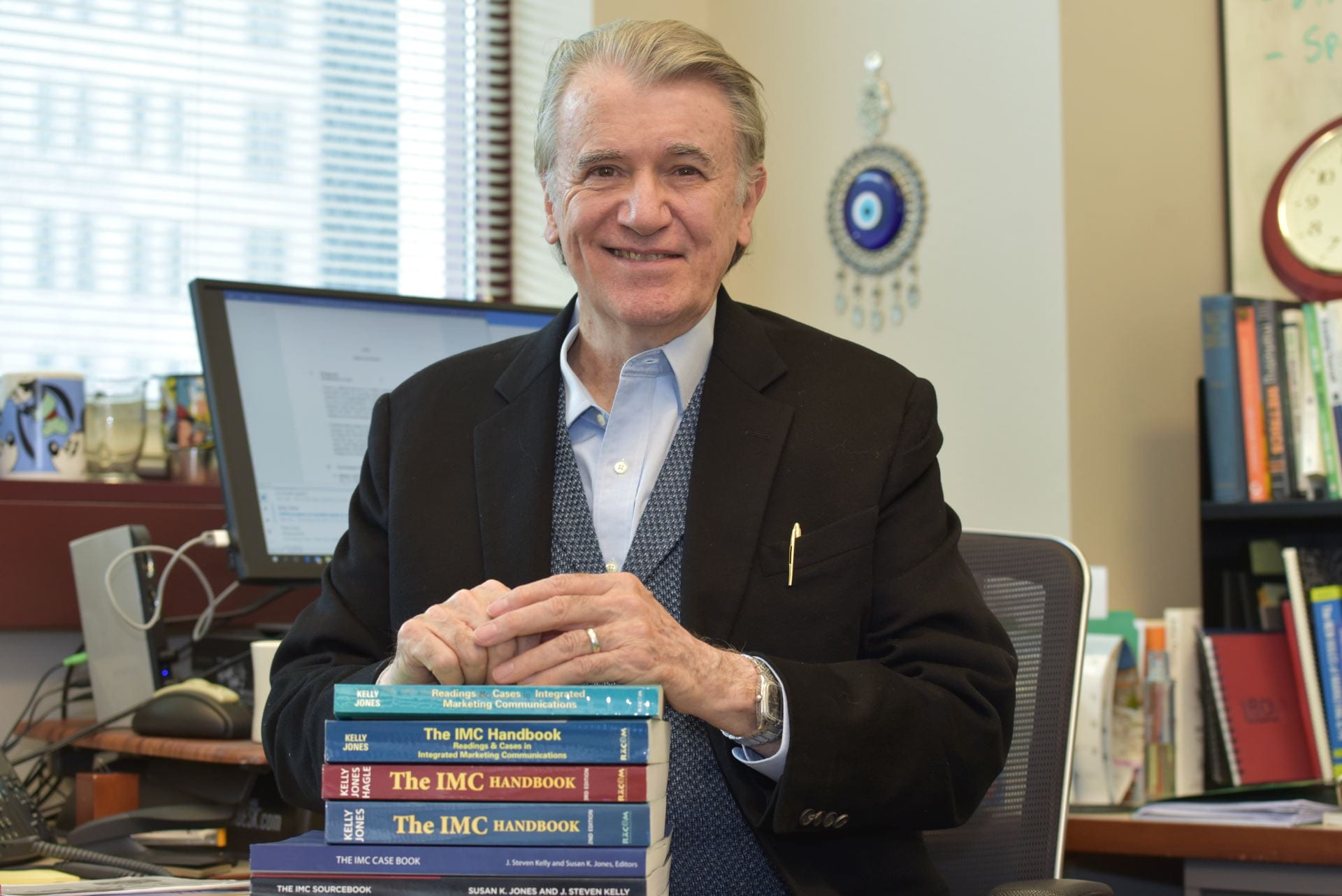
by jlansber | Apr 23, 2020 | Scholarly Pursuits

Steve Kelly, associate professor of marketing and director, Kellstadt Marketing Center
Mary Beth McCabe (MBA ’82) remembers learning a lot from the business case studies written about real brands—including EKCO kitchenware—that she tackled as a student at DePaul.
“We had to create our own product promotional characters, and our group created the character Ernie Ekco for some cooking products,” she recalls. The exercise helped her connect theory to practice and provided a useful framework for her to develop marketing strategies at work.
Today, McCabe, an associate professor of marketing at National University in La Jolla, Calif., and the owner of Sun Marketing in San Diego, develops business school case studies about marketing issues facing real companies. She was inspired to become a case writer by one of her DePaul teachers, Associate Professor of Marketing Steve Kelly, and the annual case competition he created, the Jacobs & Clevenger Case Writers’ Workshop.
This fall marks the 25th anniversary of the workshop co-sponsored by the Kellstadt Marketing Center, which Kelly directs. It started when the workshop’s original co-sponsor, the Direct Marketing Association, approached Kelly seeking strategies “to get more people interested in the field, which wasn’t being taught,” Kelly says. The workshop is now co-sponsored by Jacobs & Clevenger, a marketing agency co-founded by Ron Jacobs, past president of the Chicago Association of Direct Marketing.
Students often come to school with no idea of what they want to do. It’s usually their experience with companies—reading cases about them and then interning in that field—that helps them find their career interest.”
— Steve Kelly, associate professor of marketing and director, Kellstadt Marketing Center
The workshop is scheduled to convene at the annual Marketing Management Association (MMA) Educators’ Conference in Providence, R.I., in September. As he has done for every workshop, Kelly has lined up representatives from companies located in the host city to share information about their marketing issues with professors at the workshop. It isn’t difficult to find companies willing to participate, Kelly says, even though they get nothing in return. “These companies love to give back to the classroom.”
After the conference, the participating professors will turn the company’s presentations into case studies that challenge business students to develop solutions to the real-world situations described by the companies. Then, Kelly and DePaul marketing staff member Jessica Sanborn (BUS MA ’19) will arrange for the cases to be peer-reviewed by 20 or so professors, including DePaul faculty members. The three top-rated cases will be presented at next year’s MMA conference, where new cases will be developed. Kelly and co-editor Susan K. Jones, a marketing professor at Ferris State University in Grand Rapids, Mich., publish the cases in the biennial “IMC Sourcebook: Readings and Cases in Integrated Marketing Communications,” which professors across the country use in their classrooms.
Cases developed in the workshop bring contemporary business issues to life for students. One award-winning case co-written by McCabe, for example, puts students in the shoes of marketing executives at the electric carmaker Tesla by asking them to develop strategies for managing demand that outpaces production.
Kelly, who will celebrate his 45th year on DePaul’s faculty in June, says he enjoys managing the competition because case studies have a positive impact on students. “Students often come to school with no idea of what they want to do,” he says. “It’s usually their experience with companies—reading cases about them and then interning in that field—that helps them find their career interest.”
By Robin Florzak | Photo by Kathy Hillegonds

by jlansber | Apr 23, 2020 | Online Extras

James Valentine, a clinical professor of finance in the Driehaus College of Business and executive director of the Driehaus Center for Behavioral Finance, created a financial literacy course two years ago to help underprivileged communities in Chicago.
Students in James Valentine’s “Exploring and Sharing Financial Literacy” course aren’t just learning the fundamentals of financial literacy, they’re teaching it to community-based organizations in Chicago who want to share these skills with their communities.
A visit to one of Valentine’s fall class sessions revealed students and community leaders gathered in groups around the classroom, engaging in topics that ranged from how to create a budget to managing personal finances to techniques for improving individual credit scores. During the quarter students also met with leaders at their organizations to facilitate the lessons, deepening the hands-on learning experience for the students, who were all undergraduate finance majors.
Valentine, a clinical professor of finance in the Driehaus College of Business and executive director of the Driehaus Center for Behavioral Finance, created the course two years ago. “I wanted to utilize my finance teaching skills to help underprivileged communities in Chicago,” he says. “I’m happy I found a way to do that through DePaul, to provide this opportunity to our students.”
The coursework is heavily based on the University of Illinois’ All My Money: Change for the Better extension program, a train-the-trainer financial management program that is also offered through the State of Illinois.
Students spend the first four weeks of the course learning the foundational elements of financial literacy and principles of small group facilitation, and the remaining weeks teaching financial literacy content to the community leaders. In the process, students get to learn, apply and teach theories from behavioral finance, personal finance and adult learning.
“The DePaul University Steans Center [which supports community-based service learning] connects me with community-based organizations who are interested in receiving financial literacy training,” explains Valentine. “So far, we’ve had anywhere from five to nine CBOs participate in each course.”
The financial literacy kits that community-based organizations (CBOs) receive as part of their training, including handouts and facilitator guides, are funded by the Steans Center and the Driehaus Center for Behavioral Finance.
I wanted to utilize my finance teaching skills to help underprivileged communities in Chicago. I’m happy I found a way to do that through DePaul, to provide this opportunity to our students.”
— Clinical Professor of Finance James Valentine
Cody Cotton, co-founder of A Greater Good Foundation, was one of the CBO leaders who participated in the fall 2019 course.
“We’re a youth mentoring non-for-profit that provides social and emotional learning skills to high school and college-aged kids throughout the West and South Sides of Chicago,” shares Cotton. “It’s been extremely valuable to my organization and the youth we serve to receive this training from DePaul. And it’s helped me on a personal level, too. This class brought me a lot of self-awareness about my own habits and behaviors when it comes to finances.”

Ryan McCormick (far right) is a senior who took the class “Exploring and Sharing Financial Literacy” in fall 2019.
Ryan McCormick, a senior who took the class in which Cotton participated, says “it felt rewarding to be a part of a class that benefits the community.”
“It was an enlightening experience to realize how so many people don’t have the knowledge or skills they need when it comes to financial planning,” Ryan says.
Another positive outcome of the course was a translation project Valentine initiated with the help of the Department of Modern Languages at DePaul. “Many CBO leaders expressed the need to have the financial literacy handouts translated into Spanish since many of the under-resourced communities that need this information are Spanish-speaking,” explains Valentine. “We just wrapped up the process of translating these handouts during winter quarter, so they are available for those communities that need a Spanish version.”
“Exploring and Sharing Financial Literacy” is typically scheduled twice a year for finance majors at the Driehaus College of Business, but Valentine hopes to eventually make it available to all students at the college, especially since it meets DePaul’s experiential learning requirement. “For students who can’t afford to study abroad or aren’t fortunate enough to obtain an internship, this course provides a perfect opportunity for them to engage in experiential learning, meet that requirement, and all through a course offered in their college.”
By Nadia Alfadel Coloma | Photos by Kathy Hillegonds

by jlansber | Apr 23, 2020 | Giving Back
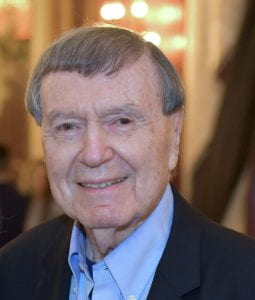
Donald M. Ephraim (BUS ’52) | Photo by Kathy Hillegonds
Donald M. Ephraim’s path to becoming a successful agent for on-air talent began with a humble job as a stock boy at a grocery store near his home on the South Side of Chicago. He used the money he earned to enroll in DePaul, becoming the first in his family to graduate college.
“My sister had married a DePaul graduate who had studied accounting,” he recalls. “Back then, I wanted to be a lawyer practicing tax law. I thought having an undergraduate degree in accounting would be helpful, and then I would get a law degree. My brother-in-law spoke highly of DePaul, and that’s where I applied.”
Ephraim excelled at DePaul and passed the CPA exam by special permission at age 20, even though Illinois law required test takers to be 21. He added a JD to his CPA after completing law school at the University of Chicago. “I lived at home during my entire college career, both undergraduate and law school,” says Ephraim. “My parents could not afford to send me to college, so I paid for all my college and law school on my own.”
After graduation from law school, Ephraim served in the army and then worked at an accounting firm and law firms before striking out on his own as an accountant-attorney providing tax and estate planning. His career path changed when former Chicago Bears wide receiver Johnny Morris came to him as a client.
“Johnny called me after I did his estate plan and said he had received an offer from WBBM-TV to come on air during football season to do Sunday night post-game commentary,” Ephraim says. “He wondered if I could negotiate his contract. I told him I’d never done that before, but I would like to try. Johnny was so pleased with the result, he talked about it to everyone. All of a sudden, clients just started coming in, and pretty soon I was a major rep in terms of television, radio and newspaper people.” Ephraim’s client list included film critics Roger Ebert and Gene Siskel, news anchor Bill Kurtis, sports announcer Jack Brickhouse, Chicago Mayor Jane Byrne and many others.
Having to fund my own education, I’ve always been interested in helping students fund theirs. I hope to inspire the students in the business school to achieve their best grades through this award.”
— Donald M. Ephraim (BUS ’52)
After decades of success, Ephraim turned his law firm over to two of his sons. “I’m in my give-back phase now,” he says. He actively supports education, arts and culture organizations near his Florida home, including the Palm Beach Jewish Film Festival and the Cultural Council of Palm Beach County. He also gives generously to DePaul through the Donald M. Ephraim Family Endowed Excellence Award, which provides a monetary prize for the highest-achieving DePaul business students at the end of their junior year.
“Having to fund my own education, I’ve always been interested in helping students fund theirs,” he says. “I hope to inspire the students in the business school to achieve their best grades through this award. The awardees with whom I’ve spoken are terrific students who really apply themselves and have great futures.”
DePaul’s commitment to educating students from all backgrounds also motivates Ephraim to give. “One of my very warm feelings for the university is the fact that when I started, there were quotas for Jewish students limiting attendance at most other universities,” he says. “DePaul had no quota. That to me was wonderful and endearing and something for which I have enormous respect, and I want to honor that spirit by giving back.”
Learn more about how the Ephraim Endowed Excellence Award helped alumna Catherine Conrad (BUS ’19).
By Robin Florzak










